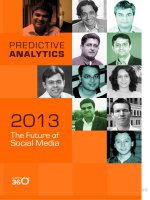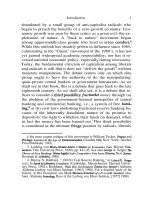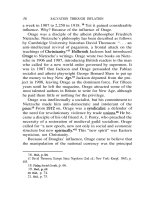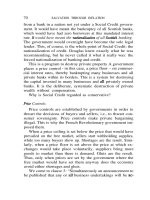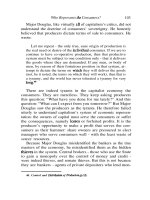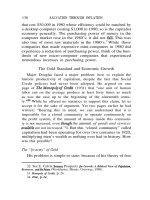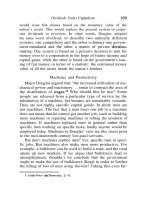Social economics ebook
Bạn đang xem bản rút gọn của tài liệu. Xem và tải ngay bản đầy đủ của tài liệu tại đây (40.07 MB, 492 trang )
SOCIAL ECO:NOl\IICS
ADELPHI ECONOMIC SERIES
GENERAL ECONOMIC HISTORY
MaJr W,~,,.
CYCLICAL FLUCTUATIO~S
Sim... .K..u"II:C
SOCIAL ECONOMICS
F.
Wi,s,r
V."
MONEY
Karl H'/JIiricl
SOCIAL
ECONOMICS
By
FRIEDRICH v'on WIESER
TranJ'lafed hy
A. FORD HINRICHS
AJ'J',".rlani ProjeJ'J'or oj EconomicJ', Brown Uni"erJ'ify
With a Prciface hy
WESLEY CLArEt MITCHELL
ADELPHI CO'MPANY
NEW "fO:RK
COPYRIGHT, 1927 BY GREENBERG, PUBLISHER, INC.
MANUFACTURED IN THB UNITED STATES OF AMERICA
BY THE VAIL-BALLOU PRESS, INC., BINGHAMTON. N. Y.
CONTENTS
FOREWORD-,WESLEY C. MITCHELL
ix
TRANSLATOR'S PREFACE
xiii
AUTHOR'S PREFACE
xvii
INTRODUCTION
1.
2.
THE METHOD OF THE FOLLOWING STUDY
THE DIVISION OF THE SUBJECT :MJ~TTER
BOOK I
3.
4.
5.
6.
7.
8.
9.
10.
11.
12.
13.
14.
15.
16.
17.
18.
19.
20.
21.
22.
23.
24.
25.
THEORY OF THE SIMPLE ECONOMY
THEORY OF THE SOCIA:L ECONOMY
I THEORY OF ECONOMIC SOCIETY
26. THE ECONOMIC PROCESS AND THE THEORY OF SOCIETY
PART
29.
9
PURPOSE AND POWER IN THE ECONOMY
18
HUMAN NEEDS
21
GOSSEN'S LAW OF THE SATIE,TY OF NEEDS
25
THE DEGREES OF HUMAN NEEDS
29
THE ApPRAISAL OF FUTURE NEEDS
35
COMMODITIES
39
BUILDING UP THE SIMPLE EOONOJ~Y
43
THE UNITY OF THE ECONOMY
49
THE THEORY OF PRODUCTS
53
THE THEORY OF LABOR
56
THE THEORY OF CAPITAL
62
THE THEORY OF LAND
74
COST PRODUCTIVE MEANS AND SPEOIFIO PRODUCTIVE MEANS, COST
PRODUCTS AND SPECnnC PRODUCTS
81
'MARGINAL UTILITY IN THE lSOLA'.I~ED HOUSEHOLD AND THE FUNDAMENTAL LAW OF THE ECONOMIC COMPUTATION OF UTILITY
85
MARGINAL UTILITY IN IDEALIZED PRODUCTION
96
THE LAW OF THE COST OF PRODUCTION IN THE SIMPLE EOONOMY 98
CHANGES OF COSTS AND THE COMPUTATION OF UTILITY
106
THE PROBLEM OF ATTRIBUTION Ol~ YIELDS
111
COMMON AND SPECIFIO ATTRIBU'rION OF Y IEWS
119
THE ECONOMIO COMPUTATION OF UTILITY
124
NET-YIELD AND THE PRODUCTIVITY OF CAPITAL
129
CAPITAL COMPUTATION
135
ECONOMIC VALUE
142
BOOK II
27.
28.
1
3
THE BASIC FORMS OF SOCIAL ,AOrION
THE INDIVIDUAL IN ECONOMIC SOCIETY
SOCIAL INSTITUTIONS
149
149
154
158
162
CONTENTS
vi
PART II THE INSTITUTIONS OF EXCHANGE
30. EXCHANGE
31. THE MARKET
32.
33.
34.
35.
36.
37.
. 38.
39.
40.
41.
42.
43.
44.
45.
46.
47.
48.
49.
50.
51.
52.
53.
54.
55.
56.
57.
58.
59.
THE PROBLEM OF THE GENERAL DOCTRINE OF PRIOES
THE FUNDAMENTAL LAW OF PRIOE-FORMATION
THE STRATIFIOATION OF PRICES
THE DEMAND-INDEX OF CONSUMPTION AND THE UNITY OF THE
HOUSEHOLD
THE FUNDAMENTAL LAW OF THE CHANGE OF PRICE
THE FORMATION OF PRICES IN THE DISORGANIZED MARKET
THE PEICE OF PRODUCTS. I. THE SUPPLy-INDEX OF COSTS
THE PRICE OF PRODUCTS. II. THE COMPETITIVE PRICE
THE PRICE OF PRODUCTS. III. THE MONOPOLY OF SUPPLY
THE PRICE OF PRODUCTS. IV. THE DEMAND-MONOPOLY
THE PRICE OF PRODUCTS. V. THE MONOPOLOID INSTITUTIONS
PERSONAL (SUBJECTIVE) VALUE-IN-EXCHANGE
E,CONOMIC (OBJECTIVE) VALUE;"IN-ExCHANGE
THE CONCLUSIONS OF THE GENERAL THEORY OF PRICE
CREDIT
THE MEANS OF PAYMENT BY CREDIT
THE NATIONAL ECONOMIC COMMUNITY OF PAYMENT
THE DEVELOPED FORM OF MONEY
THE ECONOMIC (OBJECTIVE) EXOHANGE VALUE OF MOENY, OR
THE VALUE OF MONEY
THE MONETARY MATERIAL AND THE BULLION VALUE OF MONEY
THE NOMINAL VALUE OF MONEY
THE LAW OF CHANGE IN THE VALUE OF GOLD
THE HISTORICAL CHANGES IN THE VALUE OF MONEY AND THE
DISAPPEARANCE OF NATURAL ECONOMY
MEASURING· THE V ALUE OF MONEY
THE MONEy-FORM OF CAPITAL
THE PROCESS OF CAPITAL-FORMATION IN THE MONEy-ECONOMY
THE CAPITAL MARKET
THE COMPUTATION IN MONEY
167
167
171
177
178
186
189
191
195
198
204
211
218
220
2.28
233
235
237
242
250
258
262
265
272
279
287
290
292
298
303
304
P ART III
THE
60. THE
61. THE
62.
63.
64.
65.
66.
67.
68.
69.
70.
THE CREATION OF THE COMMUNITY OF ACQUISITION AND
FORMATION OF INCOME
309
DIVISION OF LABOR
309
LOCALIZATION OF. INDUSTRY
314
THE ECONOMIC STRATIFICATION OF SOCIETY
317
THE ENTERPRISE
322
330
SOCIAL ECONOMY AND SOCIAL INCOME
334
AGRICULTURAL RE;NT
338
RENT OF URBAN LANDS
PRODUorIVE INTEREST
CONSUMPTIVE INTEREST
ENTREPRENEUR INCOME AND ENTREPRENEUR PROFITS
PROMOTER'S ENTERPRISE AND PROMOTER'S PROFITS
345
350
353
358
vii
CONTJE,N'rS
71.
SPECULATION ON THE EXCHANGE AND THE PROFITS OF SPECULATION
72.
THE THEORY OF WAGES
73. THE FORMATION OF WAGES IN THE MODERN LABOR-MA.RKET
74. Y IELD- W AGE AND THE V ALUE OF LABOR
PART IV
THE· CONSTITUTION OF THE PRIVATE ECONOMY
75.
THE) CONSTITUTION OF'THE PRIVATE ECONOMY AT THE DAWN OF
76.
77.
THE CAPITALISTIC ERA
THE DOMINATION OF CAPITALISM IN MODERN NATIONAL ECONOMY
THE THEORETICAL FOUNDATIONS FOR THE DOMESTIC POLICY OF
THE NATIONAL-ECONOMY OF THE PRESENT DAY
BOOK III
78.
BOOK
THE ECONOMIC PRINCIPLE IN STATE ECONOMY
IV
81.
372
380
389
389
400
408
THEORY OF THE STA.TE-ECONOiMY
THE PUBLIC ECONOMIC PROCESS
VALUE IN THE ECONOMY OF THE STATE
79.
80.
363
367
419
425
430
THEORY OF THE WORLD ECONOMY
82.
THE WORLD ECONOMY
THE INTERNATIONAL· FORMATION OF PRICES
83.
EXCHANGE-VALUE AND CURRENT
·VALUES
437
441
OF MONEY IN INTER-
NATION AL TRADE
444
THE EQUALIZATION OF THE INTERNATIONAL BALANCE OF PAYMENTs AND THE MOVEMENTS 0]' THE TRADE BALANCE
448
85. THE DEVELOPMENT OF NATIO:N"AL AND WORLD ECONOMIES
456
84.
ABBREVIATIONS
463
INDEX
465
1
1
1
1
1
1
1
1
1
1
1
1
1
1
1
1
1
1
1
1
1
1
1
1
1
1
1
1
1
1
1
1
1
1
1
1
1
1
1
1
1
1
1
FOREWORD
Friedrich von Wieser's Social Economics holds a place in the literature of the Austrian School such as ~rohn Stuart ;Mill's Political
Economy holds in the literature of classical theory. It sums up,
systematises, and extends the doctrines developed by the founder of
the school, the author, and his fellow 'workers. Like Mill's great book,
it is distinguished by admirable exposition-elegant in proportions,
mature in expression, authoritative in source. And it promises to become like Mill's book· the point of departure from which a generation
of younger men set out in. their efforts to increase knowledge.
Yet in certain respects a comparison 'with Mill does less than justice to Wieser. Social Economics is the first systematic treatise upon
economic theory at large produced by the Austrian School, whereas
several attempts to cover the field of classical theory had been made
before Mill wrote. Wieser's economie work is also more original than
Mill's. His own early writings ranlt: higher among the constructive
contributions which he weaves into a balanced exposition than do
Mill's Essays upon some Unsettled IQuestions of Political Economy.
More than that, in deepening and broadening his earlier discussions,
Wieser reveals again the thoroughness, vigor, and originality for
which he has always been notable. ]\fiU wrote his Principles at high
speed to round out his social philosophy. Even in later editions he
did not incorporate all the changes 'which he admitted were desirable
in the classical doctrines. Wieser, on the. contrary, broug-ht his
full power to bear upon his treatise. It is the fruition ofa lifetime's
reflection as well as the crowning achievement of a famous school.
In his Gymnasium days, von Wieser had been fascinated by Homer,
Virgil, the Niebelungenlied,. and by history which followed epic traditions. He dreamed of becoming an historian. But he came from one
of the aristocratic Viennese families whose sons commonly enter the
public service, and the path to public service was the law. While following this path at the University, he chanced upon Herbert Spencer's early writings on sociology, and was fired with a new ambition.
Spencer '8 logic convinced him for the time that the "great-man
theory" of history is an illusion; it is the culture of a people which
ix
SOCIAL ECONOMICS
produces the hero. Therefore, to understand history one must understand society first. The aspect of social relations most open to understanding is the economic aspect. And the central problem of economic life is the problem of value. So the young jurist concentrated
upon the economic courses of the law curriculum, and began to ponde!
the problem which he was later to illuminate.
Carl Menger had published his Grunds·iitze der V olks'wirtschaftslehre in 1871, and been appointed to a professorship at Vienna . in
1873. .Von Wieser did not attend Menger's lectures, but he found
in Menger's book the clues he needed. After taking a law degree
in 1875, he and his. friend Eugen von Bohm-Btawerk spent two years
at the Universities of Heidelberg, Leipzig and J ena. While at Heidelberg in the spring of 1876, the two Austrians presented reports to
KarIKnies'seminar. One report dealt with "The Relation of Cost
to Value," the other report with .the theory of·· interest. At the next
opportunity, Wieser showed his manuscript to Menger, and was encouraged to seek a· university· career.
On returning to Vienna from his German studies, the young economist received an appointment- in the Tax Administration. .In 1883
he became Privatdozent at the University. Next year he published
the book expected from aspirants to an academic chair, Ursprung
tt·nd Hauptgesetze deswiJrtsckaftlichenWerthes" and was soon
made professor in the German University of· Prague. In this first
book, von Wieser analyzed a valuation made apart from others by a
single person,. but a person who represents the population of a modern nation. In his second book, Der naturlicke Werth, he attempted
"to exhaust the entire sphere of the phenomena of value· without any
exception. " The analytic power here revealed ranked the writer
with Menger and Bohm-Bawerkas one of the three ma-sters of the
Austrian school. When Professor William Smart was introducing
the Austrian theory to English-speaking economists, he chose Wieser's
Natural Value for translation in preference to Menger's Grundsiitze.
So far von Wieser had concentrated his scientific effort· upon one
central problem. After the publication of Der naturliche Wertk in
1889, he turned to questions of money, public finance, politics, and
sociology. In. 1903 he left his chair inPtague ·to become professor
of economics in Vienna. He also served for a while as Minister
of Commerce. During the twenty-five years following 1889, his publications dealt mainly with detailed problems; but all this time he was
quietly. developing and maturing his thoughts upon e'conomic theory
at lar.~e, and upon his·still ·earlier .problem of the· relations between
society and its leaders. Always critical of his own work, he seldom
S OC I ALE. CON 0 M I C S
xi
offered it to the public except~nderpressure. But what he had already accomplished made' it sure that pressure would be applied by
those who felt concern" for the development of social science. When
the new Grundriss der Sozialokonomik was planned, Max Weber, who
had. a leading share in the direction, made it a· condition of his own
participation that von Wieser should provide the chief section upon
economic theory. Reluctantly Wieser consented. He spent some three
years in perfecting further the system. on·· which' he had been working
so long, and it appeared in 1914 under the title Theorie d,er gesellschaftlichen W irtschaft.
Under ordinary circumstances, the publication of a systematic
treatise upon economics by Friedrich 'von. Wieser would have aroused
the liveliest interest in all countries where economics is cultivated.
But the war years and the early years of peace passed before many
economists realized what an important addition had been. made to
their science on the eve of the catastrophe which bent men's minds
on destruction. When a second... edition of the volume containing
Wieser's treatise came out in· 1924, the work was probably new to
most of its readers. The present translation into. English is therefore
less belated in effect than it .seems in years. The influence upon
economic theory exercised by von "Wieser's formulation lies more
in the future than in the' past. Among the active agents of this influence may be readers who make their first, acquaintance with von
Wieser through Dr. Hinrichs.
In the United States, and perhaps in other countries, there seems
to be current an impression that the Austrian school of economic
theory has done its work-an impression which may arise from the
fact that this group of investigators won a recognized place in the
history of economic doctrines when Menger was in his prime and when
Wieser and B1ohm-Bawerk were young. Most of the present generation of active workers in economics studied the Austrian theory in
college, much as they studied classical political economy. But von
Wieser does not present his treatise as a completed system. This is a
further respect in which the comparison with John Stuart Mill fails.
When the second edition was called for, it is true that the author
declined to make any changes in his text. He had turned once more
to the conflict between his youthful conceptions of epic history and
Spencer's argument that heroes are by-products of culture-a problem of which his solution appeared last spring in Das Gesetz der
Macht. As for his exposition of economic theory, he hoped others
would find what is to be added, whait is to be changed.
xii
SOC I ALE, C 0 NO M I C S
That Social Economics incites its readers to independent thought
is, of course, its great merit. A scientific worker owes most to
solutions which set new problems. It has been characteristic of
von Wieser as a teacher that he has shown students how to work
rather than what to believe. .The same trait is characteristic of him
as a writer. A number of the ablest of his students have become
disciples, and we may expect that they will make vigoronsefforts to
carry further the leading principles of the Austrian School. But
perhaps his students who have cultivated a different type of theory
have profited by Wieser's teaching not less than the men who can
be called disciples. The translation of his exposition into English
should enlarge both of these interlinked groups-the men .who work
upon Austrian lines and the men who :find the Austrian experiments
a help toward trying something different. To whichever group a
reader inclines he will owe a debt of gratitude to Friedrich von
Wieser. Hours devoted to the study of Social Economics are hours
of contact with a living force in the world of thought.
•
Since the foregoing words were written, von Wieser has died. His
heart failed on July 23, 1926, a f()rtnightafter his seventy~:fifth birthday, while he was recuperating' from' pneumonia at his summer home
near Salzburg. A pupil and friend, Fr. Friedrich A. von Hayek,
has published a sketch of his career in' the J ahrbucker fur Nationalokonomie und Statistik. How widely he' was esteemed will soon be revealed by two memorial volumes, to which economists of many lands
are making contributions. There is no need to alter what I wrote a
year ago: though Wieser himself has gone, his work remains "a living
force in the world of thought."
WESLEY
New York City,
May 1st, 1927.
C.
MITCHELL.
TRAN SLAT,OR,'SPREFACE
The presentation of Friedrich
ONOMICS
to a larger group of
l~reiherr
Eng~lish
von Wieser's
SOCIAL EC-
readers requires no apology.
In his foreward to this translation l?rofessor Mitchell has briefly summarized the position which this work holds in the development of
economic theory. That it is the only systematic treatise of the Austrian school is ample justification for its presentation. While any
further word with reference to the general place of this treatise in
economic literature is uncalled' for, I' take this opportunity to pay
tribute to certain features of the work and to forewarn the reader of
certain qualities for which he may not 'be prepared.
The work haa a logical sequenc€~ that is admirable, Von Wieser
starts with an idealized simple econom~r and ends with a presentation
of the protectionist plea in a world economy. (The method and
development are described in Sections 1 and 2.)' Thruout the course
of the 'argument no concept is introduced that later proves extraneous. At no time does he find it necessary to develop a point that
could have been elaborated earlier. He develops a point and puts
it by, later returns to it and carries; it forward. But there is no confusion; the thought never become8 snarled.
The table of contents gives some clue to his logical method. The
book progresses with an accelerating tempo. The groundwork is
laboriously laid in the simple econ.omy. It is further elaborated in
the first two parts of Book II on the social economy. At about this
time his method of reaching back for earlier conclusions becomes conspicuous. More and more frequently he makes passing reference to
a conclusion worked out in an earlier section. His presentation becomes briefer and briefer, until he reaches the end with a suddenness
that is startling to one who has grnwn used to the meticulous development and qualification in the earlier sections.
In addition von Wieser manifests a clearness of observation and
appreciation of the limitations of idealized thought that make the'
book a valuable contributi~n to economic theory. He frequently
points out that the classical writer,s drew conclusions from idealized
premises and then erroneously applied them without modification to
actual life. In his own work he clearly shows the dangers of applyxiii
xiv
TRANSL,ATOR'S PREFACE
ing idealized conclusions without restriction. He explains his method
at length in the early sections of the book, which I shall not anticipate. The reader may take issue with conclusions based upon preliminary idealization and a later approximation of actual conditions;
he may indeed not believe in the validity of deductive reasoning on
economic problems. But it may never be said of von Wieser that
he has not himself clearly stated the limita.tions of his theory. It
,vould. be a great injustice to quote 'from the .theory of the simple
economy. without examining the later restrictions which he imposes
on the applicability of the conclusion to reality.
In this connection one should clearly distinguish between the, small
type at the end of many sections and the ordinary. footnote. The
luain text follows to a conclusion. Then comes an addendum : at'
times a critique of general theorY,again a cr~tical analysis of the applicability of his own thought, sometimes a mere. footnote. It 1S
quite evident that in selecting the change. of type .von Wieser distinguished the .relative importance of the two. The. translator hazards the advice, however, that many of the best passages are found
In these sections where the author throws aside the logical drive of his
main argument and rests by the wayside. It is here that I have most
enjoyed the keenness-but more important, the honesty and realism
-of his. thought.
A translation has cer'tain obvious. disadvantages. There is first
the difficulty of a precise rendition of .words .that may usually be
perfectly understood by any reader of the original. A Rechtsub jekt
is given in the text as the "legal owner" without doing violence to the
sense of the text,. although I know of no justification for such .a
translation except that it ;avoided either a two-line explanation of a
non-essential or a rather shocking Germanism. Kapl:talwidmung is
actually a dedication of capital. It is more than saving. But in the
course of repetition" a will to dedicate capital" has seemed tome to
justify the slight inaccuracy of "a will to save." A few words are
quite difficult in their shaded meanings. for one not born. to .German.
Wirtschaft has several related meanings that can only be nicely
selected. by the original author. May 1 further beg the occasional
sympathy of the reader in rendering words that are adapted to an
unusual sense in the original-the rendition of two of which causes
a kind critic in Austria to complain, with the addition, "dieStell·e ist
a·uch .in Deufschen reichUch unklatr" f
In the second pla.ce. certain. words .are either coined or· adapted
T RAN S L A TO R ' S PREFACE
xv
for the entire presentation that carry· a usual English connotation
other than that desired in this book. Specific has no meaning in
English that even suggests the sense developed in Section 15. At
times this is confusing. A referenee to "specific goods" may be
conceived to be more particularization, an order to stop thinking of
goods as an abstraction and to think instead of cows or wheat. Actually the author intends thruout to contrast" specific character" with
cost-character. To minimize the confusion as far as possible I have
never used this word in any other sense than that established in
Section 15. Another word, acquisitive, may give occasional pause.
"Natural" is almost always used in opposition to monetary, not to
signify something which exists in nature. "Historical" is often used
to imply nothing more than an actual condition.
Even more serious are subtler obstacles to translation. Von Wie~
ser's language and thinking are· both German. In German even
the most involved sentence may have character. In the face of such
passages the translator's duty lies in a compromise between offensive
transliteration and the danger of a subtle change of meaning as dependent and qualifying phrases are reordered. I t is unnecessary
to add that I have done my best to hold the original meaning.
Finally there is danger in the translation of a word with shades
of meaning in a passage that involves the prejudices. By study of
the context and of other passages, and by consultation I have sought
never to put into von Wieser's mouth a phrase that would better suit
my temper than his convictions. My duty has been that of a translater who, though he has no responsibility for the ideas set forth and
in fact disagrees with them in part, must be completely faithful in
their presentation.
Aside from these matters the book has certain characteristics of
"rhich American economists should be aware. One section of the
book, Section 70, can only be read ag'ainst the background of German
corporation law. A few other passages are colored by national institutions. In contrast with this natural. limitation are a few archaic
illustrations. Von Wieser is describing truths that know no national
boundaries, that recognize tim~ Qnly in changing external manifestation. The illustration of these truths may therefore be drawn without particular reference to time.
~Jonetheless
the pre-war illustra-
tions are occasionally startling. The F'ranco-Prussian War is "the
last war. " He disregards "our latest acquisition, BosniaIIerzegovinia. ' , Von Wieser himself explains in his preface that
XVI
TRANSLATOR'S PREFACE
he did not feel it essential to revise his references in the 1924 edition
and why.
Parenthetically one may remark that this lack of "windowdressing'" is in one sense admirable. For one who believes with von
Wieser that in the near future all essentials of the simple economy,
all true fundamentals of economic theory, may be established, there
is no reason to revise all the illustrations in the book except to make
them intelligible to a class whose social experience dates back only to
1923. It is the clearest admission of the limitations of the theory.
There is no attempt to hide' abstraction in statistical table revised for
the latest· census.
The work of translation has been made possible by the cooperation
of others. Mr. W. F. G.Geisse of Great Barrington, Mass., prepared
a. first draft that enabled me to give especial attention to the economic
terminology and the English rendition of the whole. Dr. Friedrich
A. von Hayek, a pupil and close friend of von Wieser, has read the
proofs and submitted many suggestions. Finally the loyal help and
cheerful good humor of my wife pulled this translation thru long
evenings of drudgery that inevitably occur as part of such work.
A. F. HINRICHS
Brown University,
May, 1927.
AUT H 0 R 'S PRE F AC E
The Theory of the Social Economy, .which I published shortly
before the outbreak of the W orld War, brings together the results of
the studies with which I have been concerned since the beginning of
my economic thought. Like other writers of the Austrian school,
I began with the theory of value. Grad.ually, I passed through the
entire circle of phenomena in social economy, state economy and
world economy. To all of these I attempted to apply the same
method which the Austrian school developed for the theory of value
and price. My aim was to show that the entire social economy is
built up with a view to management and value. To be sure, only a
part of, the organization may be explained in purely social terms.
Another part·· must be explained in terms of those who possess power
in the nation and in the world. But the meaning of power also
has a social basis. No power has ever been sufficiently great to
proceed entirely without consideration of the general meaning of
management and value. Powerful persons are merely in a position,
in building up the economic organization, to carry through their
personal interests rather than the general interest. Thus they are
able, at those points which they regard as critical, to replace the
social mind by their own. By this means the social consciousness
is falsified and made to appear contradictory. It seemed to me that
the highest task of theory was to show in what relations this consciousness and power were in harmony and in opposition in the
creation of the social, state and world economy. A theory which
succeeded in showing this would enable one to see clearly the direction in which the 'interference of counter-force and, above all, of enlightened statesmanship was needed, in order that the economic or~
ganization might become truly social. Such a theory will also indicate
for the modern 'state the theoretical groundwork for a suitable internal and external political economy. In particular, it will point the
way to needed reforms. Reaching forward, it will also serve a more
purely social state 'of the future, which the proletarian thinkers interpret as socialistic, but the final form of which we cannot yet see
accurately. It will 'serve this state in that it will establish those
most general elements of management and value which have always
existed and will always exist and which, therefore, cannot be absent
xvii
xviii
AUTHOR'S. PREFACE
in any economic order. Thus this theory may clearly indicate to
the state of the future what it must take over from the present order.
Even when I published The Theory of the Social Econom,y, I
was aware that I was in a position only incompletely to reach my far
distant goal. In the ten years which have since passed, the deficiencies of my work have become even more apparent to me. But
owing to the pressure of other events, 1 have been unable to find leisure to express my thoughts more pertinently. As the publisher advised me that anew edition of the book had become necessary, I was
forced to explain to him that I was not in a position to undertake revision. We therefore agreed to publish the second edition as an unchanged reprint of the first. I have merely increased the references
to the literature. In the, text itself few corrections were made. The
reader is therefore not to be surprised if he finds references, for example, to pre-war monetary conditions or the economic condition of
Austria-Hungary as it existed before the war. It may also be remarked that I believe such mention of pre-war conditions has greater
illustrative value than mention of the opaque and transitory condition
in which the world finds itself today. But all this is incidental, for
in the main I think I, can establish that the same goal of theory
that I set up in the first edition exists for any theory of the social
economy after the World War and revolution.
Never has there been as deep and pressing a need of economic theory
as in the present. At the time when the representatives of the classical school were thinking, out their principles of economy, practical
interest was confined to the question of the degree of freedom which
the state should give to private economy as such. The socialistic
thinkers fought the laissez-faire attitude, of private management. One
who gave no great weight to their objections set himself scientifically
apart from them. One did not dream that the day would come,
was indeed near, when the proletariat should be strong enough to give
pertinence to its demands by force. In the wake of the vVorid
War this day suddenly arrived. In Russia the experiment in socialism was carried through in the most extreme form "of ,bolshevism.
Almost everywhere in Europe the proletariat has come forward with
such strength that it must be considered and, a counter-reform of
the economic order proposed. I t will not be long before the same
thing will come to pass in the United States. The flourishing America
of today can better satisfy its workers than aging Europe. In the
rapid progress of its development it may allow greater benefits to the
entrepreneurs who lead the way. But as soon as the movement be-
AUTHOR'S PREFACE
xix
gins to ebb the workers will be as eager to undermine the power
of the entrepreneur as they are today in Europe.
The final distinction between· possessors and proletariat will not be
successful without the aid of theory. Both class6s have sought
scientifically to strengthen that position which their own interests have
led them to take, and both have thus made errors with seriousconsequences. The proletarian thinkers have fastened on untenably impractical dogmas. The bourgeois thinkers on the one hand have developed their own case, but on the other they have left too many loopholes in the explanation. Endless sacrifices would be required were
there no other means than that of trial and .error to clear up the
order. Of course, it is necessary that there be such attempts. Power
will also make its influence felt. In time, however, theory will be
called upon. This time will come so soon as one begins seriously to
suffer from the errors of practice and so soon as it is realized that
raw power can work evil but cannot heal it. But when this happens,
theory must have unified its thought sufficiently so that men may find
the necessary help in it when once their thoughts advance to a point
at which they may subject their wishes to the insistent commands
of reality.
The classical theory and the socialistic theory deduced from it have
not come to an agreement. The classical theory pushed into the relations of the social economy only so far as seemed necessary to give
grounds to the demand that labor be freed from governmental constraint. The socialistic theory eagerly took over the unfinished classical theory, as the strongest support for the demands of the workers
seemed to be here. The openly unsatisfactory nature of the classicalsocialist theory that comes into insoluble conflicts with actual conditions led many economic scholars, particularly in Germany, to discard
it entirely. The scholars devoted themselves to the great practical
task that was constantly and forcefully raised hy the stormy modern
development, and remained satisfied to raise the scientific foundation
which is required from the historical development of the national
economy. Just as the last scientific generation in Germany turned
in this manner from the theory to the problems of socio-economic
politics, this appears now to be happening in the United States. In
England, the home of classical theory and the country in which this
theory best fitted the conditions of life,. the connection between theory
and practical politics was best maintained. But even here the merchant class lacked the strongest support of a convincing theoretical
foundation. The· proletarian class alone·· found this support which
xx
AUTHOR'S PR'EF'ACE
might be ded.ucedwithforcefullogic so soon as one had passed over
the unreal fictions of the classical labor-theory. There is no doubt
that the increased- scientific self-confidence of the proletarian thinkers,
which the masses shared, has been a powerful aid in increasing the
feeling of power by the ,masses. They thought that they' had infallibIe evidence that they were in the right at all points.
Xn the meantime, in all countries that led in scientific thought,
serious, thinkers had begun to attack the fundamental economic problems from a new' point of view without immediately considering the
practical application of their ideas. Men writing in German, English
and French, who were later followed 'by Hollanders and Italians,
found themselves together on a new path, in that they derived the
meaning of economy and of the closely connected value from the care
for the utility of goods, and in that they clearly laid down the law
by which men measure utility in the economy ~ Just as the discoveries
of physics, which were the result of purely scientific inquiry, opened
the way to numerous technical applications, so the new truths of
economic theory, because they are pure truths, may be called
upon to give a firm foundation to the', ends and means of the social
order. The experience of management and value, extending over
many thousa,nd, years, cannot be meaningless; it cannot be 'a single
great error. It is a necessary result of the nature of man and the
economic environment. Modern theory has succeeded in pointing out
these experiences. The contradictions which the classical-socialistic
theory could not solve, have been removed by the theory of marginal
utility. This theory gives us the key to the understanding of economic computation as it is applied in practice. But' at the same time
that it enables us to understand, the sense of the economy may be
perverted from a social point of view when the mighty utilize their
superiority for themselves. The powerful person may extend his
margin of the use of goods to include the superfluous and vain uses,
while he presses the weak down to the bare needs of existence or
even below this level. One sees that it is foreign to modern theory
to defend the degenerations of power. On the contrary, it is quite
apparent that the modern theory in its fundamentals 'is nothing less
than a theory of possession, and that it gives the most effective weapons to the socialistic critic. To be sure, it takes from socialism the
theoretical foundation on which it has stood until now, but in so
doing it does not weaken the position of socialism but rather increases
its critical power. In the place of a doctrine that appears logically
forceful but is actually foreign' to experience, is given a ioundation
AUTHOR' SPREF ACE
xxi
of laws that are rooted in the experience of thousands of years and
that will hold in all future time. These laws will become invalid
only if the most unlikely condition arises and the want which calls
forth anxiety for the utility of goods disappears .before a free superfluity of goods.
Revolution has brought forth no new fundamental economic
thought. The bolshevistic experiment seeks to give reality to socialistic doctrines whose thought had stiffened to dogma. Whether the
experiment has succeeded or not is still in dispute. Therefore the
experiment at least at present does not have conclusive force. He
who would form a judgment of its significance must first see clearly
the sense and absurdities of the practical economy. The highest
duty of theory could not be performed by the classical theory and
even the more deeply penetrating theory of today has not completed
its work. To complete this work is the task or the present.
The firmness with which I oppose the classical theory must not be
interpreted to mean that I lightly appraise its significance. On the
contrary, I recognize it as one of the most brilliant and practically
significant efforts of the scientific mind. In spite of all attacks it
has not yet lost its influence on theory and practice. B1eing complete
in itself, it has withstood every attack that does not rest on a similarly
closed system. Every new economic theory must first be measured
by the classical theory. No matter how great an advance may be
made, it will only deserve to be considered as a continuation of the
work begun by the great classical masters. In this case, however, the
continuation entails at many important points also a retracing of
steps. At certain difficult cross-roads we must follow a different
direction from that taken by the classicists. But in spite of this, their
fame remains undisturbed as the first to have been on the ground
and even to have showed, by their mistakes, the way to those who
followed.
Because of the dominating significance which attaches to the classicists, it has seemed required of me to compare the modern theory
with their propositions at all decisive points in orde~ to place the
opposition in the clearest light. I have, however, satisfied myself to
refer to the classical doctrine in its most general thoughts without
entering into details and following the changes which the fundamental
ideas received at the hands of each author.
I have not had space to concern myself with the literature of
derived ideas. The sum of the expositions which I have to present
to the reader is of itself so heavy, that I had to avoid increasing it by
an arrangement of the literature. I could do this all the more eas-
xxii
AUTHOR'S PREFACE
ily because in the Fundamentals of Social Economics, of which The
Theory of the Social Economy is a part, a specific section by Schumpeter has already been seen on Epochs of the History of Dogma and
Method. I commend this excellent presentation to the reader.
F. VON WIESER
INTRODUCTION
§ 1.
THE ME'THOD OF THE FOLLOWING STUDY
The "Psyohological Bchool"-'1'he instruments of the isolating wnd, ic£eaZizing
hypothesis and of decreasingabstraction-LQIYI,guage atnd its concepts---The tas'lv
of modern eoonomio theory.
The remarks on method which follow do not aspire to the dignity of a
methodology. All I desire is sufficiently to acquaint the reader with the method
of my investigation so that without distrust or misunderstanding he may accept
my starting point seemingly so remote from actuality_ From this point the
enquiry may proceed to its completion in the economy of society, of the state
and of the. world at large. For. further enlightenment I refer to my earlier
works: Ueber Ursprung and Hauptgesetze des Wirtscha,ftlichen Wertes, 1884,
(I. Die wissen8chaftliche Bedeutung der Sprachbegriffeand, Wesen 'Under H auptinhalt der theoretischen Nationalokonomie (Zeitschr. F'.G.V~ 1911).
This investigation uses the method recently designated as the "psychological." The name is applied because the theory takes its point
of departure from within, from the mind of the economic man. I
myself once spoke of economic theory in this sense as applied psychology. The designation, however, is not a fortunate one. It may
lead to the misunderstanding that the "psychological" economic
theory starts from scientific psychology. This is by no means the
case. It has still less to do with physiology, as an even more serious
misunderstanding has tried to make it appear. The observations conc.erning the inner life of man, which our "psychological" theory of
economics develops, have been made by it independently. They are
entirely independent of the result which scientific psychology might
reach with regard to the psychical elements, the analysis of which
are within its province. Physiology is even more markedly outside
of economic theory. One should especially emphasize the fact that
Gossen's law of satiable wants, the foundation of the modern theory
of value, has nothing to do with Weber's law. Economic theory
would be benefited, had scientific psychology advanced further beyond its beginnings; but our discipline does not seek and could not
find direct aid from this source. The tasks of the two branches of
knowledge are entirely distinct.
It is the problem of economic theory to exhaust scientifically the
content of everyday economic experience and to interpret it. All
persons are familiar with a narrow, practical sphere. From these
limited views theory deduces abroader interIJretation whiGh enables us
3
